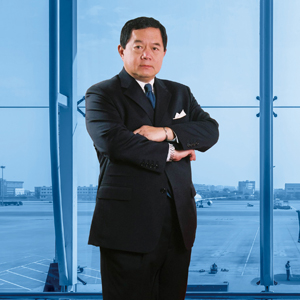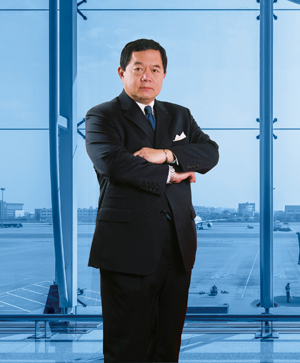2018年06月號 領航者的話
Seizing the trend with an innovative mindset will propel FEG onto the global stage
Chairman of Far Eastern Group / Douglas Hsu


Dgital innovation and Industry 4.0 continue to represent the challenges facing enterprises globally as artificial intelligence, IoT and Big Data change our way of life and create a highly volatile business environment. Throughout our 68-year history we have striven to adapt rapidly to the contemporary business climate and in these turbulent times Far Eastern Group (FEG) has embraced innovation, transformation and restructuring in order to maintain our position ahead of the curve and remain poised to grasp every opportunity for future growth.
In this increasingly interconnected world, a single political, economic or environmental event that takes place in one country may have an exaggerated global impact. On the political front, the U.S. President Trump has embraced protectionism and is pursuing “America First” agenda. The Trump’s administration officially withdrew from the Trans-Pacific Partnership and the Paris Climate Agreement as well as planning to renegotiate the free trade agreement with South Korea and the North American Free Trade Agreement. In addition, the country’s tax reforms, change in energy policy and immigration ban will undoubtedly affect the rest of the world. In Europe, national leaders are also faced with political challenges. The new French President Macron’s political views and policies on launching initiatives aimed at modernizing France frequently draw global attention, while the German Chancellor Merkel’s policy dilemma between domestic affairs and EU shake-ups caused her political clout to decline. The United Kingdom is still negotiating its exit from the European Union while Italy continues to suffer from political gridlock, regional division, and a worsening relationship with Europe. In Asia, geopolitical tensions are high. Although the PyeongChang 2018 Winter Olympics and the Inter-Korean Summit seemed to defuse the tensions on the Korean Peninsula, the future of the peninsula remains unpredictable. The 19th National Congress of the Communist Party of China was held last October, electing new committee members and then in 2018 presidential limits were eliminated, consolidating President Xi’s position as national leader for the foreseeable future. Last year, China also played a leading role in regional economic alliances and international conferences, including the G20 summit and the Belt and Road Summit.
On the economic front, the four major economies, namely, the United States, the European Union, China and Japan, have enjoyed economic growth, while emerging economies have also been recovering, but the strength of their growth is subject to their respective industries. In the United States, the Federal Reserve has announced plans to reduce its balance-sheet assets and raise interest rates. Across the pond, there are still uncertainties surrounding the future of the European Union after Brexit. In Asia, Japan will continue its accommodative monetary policy, while China will keep opening up to the world’s financial markets, expanding its influence on the global economy.
In addition to political and economic changes, a multitude of factors also present challenges to businesses worldwide. For example, energy and commodity prices are on the rise. The oil producers’ agreement to cut back production, the geopolitical tensions in the Middle East, the increased shale gas production in the United States, the rise of renewable energy and the growing sales of electric vehicles are all driving fluctuations in raw material prices. Climate is also playing an increasing role in business decisions as environmental regulations become more stringent as a result of heightened awareness of climate change. Technological advancement is paving the way for the rapid development of artificial intelligence and the rise of the innovative economy is sure to rewrite the rules of business. In Taiwan, despite the promising economic prospects, there are numerous obstacles to overcome, such as its stagnant integration into regional economy, limited participation in world trade and the cross strait relationship. Local enterprises are further challenged by the new labor regulations, power and water shortages and the pressures of rapid industrial transformation.
With a unique vision for investments, FEG stays agile and flexible at all times in response to the challenges ahead. Far Eastern New Century Corporation (FENC) will not only carry out restructuring plans in Taiwan, China, Vietnam, Japan and the United States, but proactively strive for more business opportunities around the world. In order to capitalize on green opportunities, we have not only obtained many high-standard green certifications but also will mobilize more resources for R&D to improve eco-friendly and innovative technologies. Meanwhile, we have implemented industry 4.0 factories to pursue industrial upgrades. Our R&D team always stay on top of new trends, introduces new concepts and seeks to innovate new products with businesses from other industries. As a leader in industry, FENC branches out to drive profit growth. Established 20 years ago, FarEasTone Telecommunications Corporation Limited (FET), a pioneering ICT and digital application service provider, has begun to develop 5G technology. Not only is it the first telecom operator to have NB-IoT in commercial operation, FET has passed the National Communications Commission's review to become the first company to obtain approval for 3 million IoT gateway numbers. Asia Cement Corporation (ACC) enjoyed a huge growth in profits. Asia Cement (China) Holdings Corporation, in particular, was strong quarter by quarter and became one of the top ten cement companies in China. In response to the changes in the retail industry, Far Eastern Department Stores Limited (FEDS) has taken the lead in further integrating online and offline sales channels, thereby taking better advantage of opportunities associated with e-commerce. The construction of Chubei New Century Shopping Mall has commenced and the mall is slated to open in 2020. Located in the hub of the Hsinyi District, Taipei, FEDS A13 has planned an omni-channel smart mall. Oriental Union Chemical Corporation (OUCC) also had a significant growth in revenue last year. As a major supplier of the highly competitive MEG, the key feedstock for producing polyester, Far Eastern Union Petrochemical (Yangzhou), OUCC’s subsidiary, has adopted cutting-edge chemical and biochemical technologies in pursuit of higher profits.
Regarding the property development strategy, our priority is the development of the Taipei Far Eastern Telecom Park (Tpark), which has been built to promote urban transformation and industrial development. Going forward, Tpark will join forces with New Taipei City government and Amazon Web Services (AWS) to create a joint innovation center. Now we have entered the second phase of the Tpark’s construction. The IDC building and the second R&D building broke ground last June and are expected to effectively increase our asset value and bring in substantial rental income. While the phase II of California Dream, the residential project close to Far Eastern Hospital MRT Station, is nearly sold out, Far Eastern Construction’s premium residential project located in Tpark is about to enter the sales stage. The aforementioned project has a gross floor area of 7,000 pings for sale. As the tallest skyscraper in New Taipei City, Mega Tower is now a landmark in the area. Consisting of shopping malls and restaurants with views from the highest floors, Mega Tower is creating local prosperity and boosting land values. In addition, we own land of 17,000 pings in Wugu and 14,000 pings in Kuanyin. Flexible development of these land resources will enable us to raise the value of our assets.
While FEG adopts practical and innovative approaches to developing the Group sustainably, we believe it is equally important to give back to society and help the neighborhood develop in the positive direction. Our efforts are focused primarily on healthcare, education, technology as well as culture and environmental protection. So far, we have established four foundations, three schools and two medical facilities. Over the years, the numbers of our hospitals and clinics’ outpatients have been growing. Far Eastern Memorial Hospital has continued to develop new medical technologies and established the first joint care center for people with dementia in New Taipei City. In order to provide patients with high-quality medical services, the hospital has been proactively developing innovative medical programs and seeking international medical collaboration. Moreover, the educational system supports almost 20,000 students as a talent pool in order to establish an elite and sustainable learning center. Our foundations organize awards to honor outstanding individuals. The Y. Z. Hsu Scientific Award, for example, has been established to reward achievements in five emerging technological fields, namely, communication technology, optoelectronics technology, nano science and technology, bio-medical technology and green technology. FEG has also spared no efforts to promote health, environmental protection and social care. We organized FENC Classic Marathon with nearly 7,000 people signing up for the event. The jerseys that the athletes wore were made of ocean waste PET bottles.
For nearly 70 years, we have valued sincerity, diligence, thrift, prudence and innovation as the overarching principles that guide our business operations. FEG will continue to keep abreast of the times, stay on top of global trends, develop cutting-edge technologies, focus on new markets and seek new business opportunities. We will pursue innovation as well as upgrade and transform our businesses so as to create greater value for clients, employees and shareholders. (Abstract from Business Report of FENC 2018 Annual General Shareholders’ Meeting)#



















